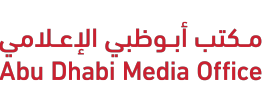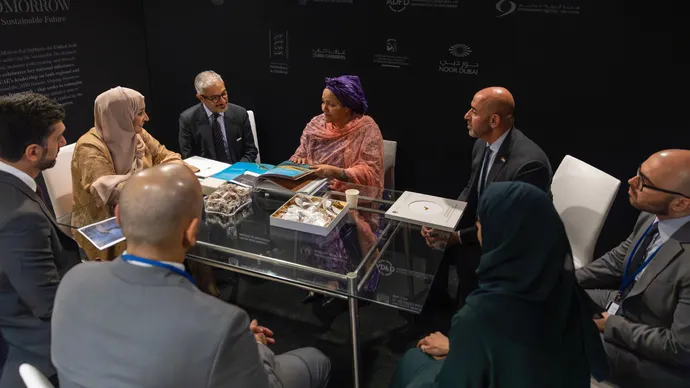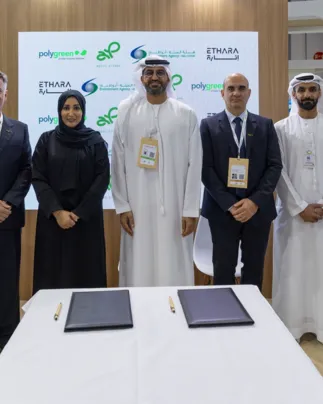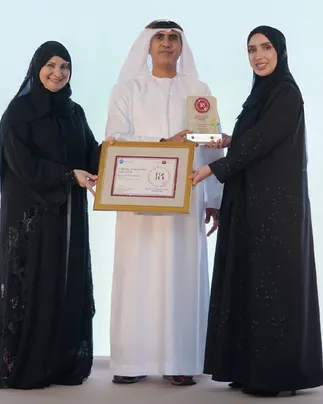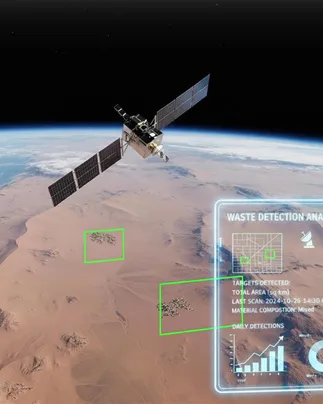The Environment Agency – Abu Dhabi (EAD) has showcased Abu Dhabi’s global leadership in marine conservation and sustainability at the 2025 United Nations High-Level Political Forum (HLPF), as part of the UAE’s official delegation. Held at the UN headquarters in New York from 14 to 23 July, the HLPF is a central platform for reviewing the progress of the 2030 agenda.
In collaboration with the UAE Government Experience Exchange Office (GEEO), and the UAE SDG Secretariat, Her Excellency Dr Shaikha Salem Al Dhaheri, Secretary General of EAD and Vice Chair of the Global Council on SDG14, participated in a series of high-level sessions advancing the Sustainable Development Goals (SDGs), with a focus on SDG 14: Life Below Water. Her participation reflects the UAE’s commitment in accelerating the 2030 SDGs and its role in building global consensus on sustainable development to enhance global stability and prosperity.
Her Excellency Dr Al Dhaheri attended the official opening of the UAE exhibition, which spotlighted the country’s progress across priority SDGs. She presented Abu Dhabi’s contributions in marine habitat restoration and environmental innovation, including its leadership in global platforms such as the Mangrove Alliance for Climate and the upcoming IUCN World Conservation Congress taking place in Abu Dhabi in October 2025.
During the official SDG14 plenary session, Her Excellency Dr Al Dhaheri delivered a keynote statement, outlining Abu Dhabi’s transformative achievements in marine conservation, blue carbon innovation, and sustainable fisheries governance.
Her Excellency said: “In the UAE, we have made SDG14 a national priority – a commitment grounded in science, backed by policy, and enabled by finance. Abu Dhabi serves as a prime example of what’s possible. We are restoring critical blue carbon ecosystems, from mangroves to seagrass meadows, and we’ve launched the world’s largest coral rehabilitation initiative, targeting over four million coral colonies by 2030.”
Dr Al Dhaheri also highlighted Abu Dhabi’s marine biodiversity efforts, including safeguarding the world’s second-largest dugong population of 3,500 individuals, monitoring over 7,900 sea turtles, and deploying environmental DNA and AI-powered tools to map species health. She also highlighted the emirate’s success in raising the Sustainable Exploitation Index from 8.9 per cent in 2018 to 97.4 per cent by the end of 2024 – a result of data-driven fisheries management and policy reform.
At the UAE-led ministerial roundtable, Scaling What Works, she joined global leaders to showcase tested SDG interventions. During the session, His Excellency Abdulla Nasser Lootah, Chairman of the UAE National Committee on SDGs and Deputy Minister of Cabinet Affairs for Competitiveness and Experience Exchange, launched the 2025 edition of the SDGs 2045 Report.
His Excellency said: “The UAE is championing a forward-looking vision through the proposed SDGs 2045, reflecting our commitment to long-term sustainable development. Aligned with the UN’s Pact for the Future, the framework highlights the UAE as a co-creator of innovative solutions to global challenges. Through platforms like the HLPF and the World Government Summit’s SDGs in Action Forum, the UAE continues to convene international thought leaders to shape inclusive, resilient, and adaptable development pathways.”
During the Rapid-Fire Solutions Showcase roundtable, Her Excellency Dr Al Dhaheri expanded on Abu Dhabi’s integrated approach to marine sustainability. She said: “Restoring our oceans is about more than science or finance. It’s about political will, and Abu Dhabi’s experience demonstrates what can be achieved through local leadership, regulatory courage, and long-term investment. To truly scale what works, we must fund what works and replicate it through inclusive global partnerships that cross borders, sectors, and generations.”
Her Excellency chaired the SDG14 Ministerial Roundtable during the GEEP Global Retreat, hosted at the UAE Mission to the UN. His Excellency Lootah delivered the keynote address, reinforcing the UAE’s role in global cooperation.
The session focused on the theme Sustainable Environment, bringing together high-level representatives from partner countries, UN agencies, and academic institutions. In her opening remarks, Her Excellency Dr Al Dhaheri stressed the need for international collaboration and inclusive marine governance to tackle the challenges facing the world’s oceans.
She said: “While SDG14 remains one of the most underachieved global goals, we’ve seen powerful examples that prove progress is possible when science, policy and partnerships align. She also presented key findings from Abu Dhabi’s 2022 Jaywun Expedition, which mapped microplastic presence across 25 countries and eight marine ecosystems. She also highlighted data from EAD’s Fisheries Resource Assessment Surveys and genomic research on key commercial species.
Her Excellency concluded by citing success stories including the rehabilitation of 4 million coral colonies and the return of rare fish species like the white-spotted grouper, reinforcing the role of science and community engagement in building resilient marine ecosystems.
She said: “Abu Dhabi’s experience offers a blueprint, demonstrating that reversing decades of marine degradation is possible with evidence-based policies, inclusive regulation and shared accountability. Let us act with the urgency our oceans demand. Abu Dhabi is ready to lead, collaborate, and inspire a new era of ocean recovery – because when the ocean thrives, so does life.”
Dr Al Dhaheri also participated in bilateral meetings, joining fellow delegates at the UAE Cultural Night, and engaging with representatives from the Food and Agriculture Organization of the United Nations to explore collaborative action on sustainable food systems and biodiversity, and with the New York City Department of Environmental Protection to discuss urban environmental resilience and pollution control.
The HLPF 2025 concluded with a renewed commitment to accelerate SDGs before 2030, reaffirming EAD’s role in global environmental leadership and continued commitment toward advancing SDG14 through knowledge exchange, sustainable finance and marine innovation.
As the UAE prepares to host the IUCN World Conservation Congress in Abu Dhabi later this year, EAD’s presence at HLPF 2025 marks a critical milestone in positioning the emirate as a global hub for environmental leadership, nature-based solutions, and sustainability diplomacy.
